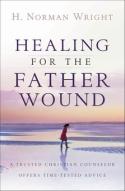H. Norman Wright on Healing for the Father Wound

Homes without a dad's everyday presence have become the norm for many families in America today. Sadly, the wounds resulting from a fatherless upbringing follow children well into adulthood, affecting daughters in unique ways. H. Norman Wright, an experienced family counselor and certified trauma specialist, has worked with countless women over the years, helping them heal from their losses and embrace hope in the Heavenly Father. He recently sat down with Crosswalk to discuss the new release of his book Healing for the Father Wound (Bethany House, 2008). Here’s a glimpse into our conversation:
Crosswalk: You’ve counseled a lot of women with what you call “father-shaped holes.” Just what is this “father-shaped hole” and how do you see it affect women?
H. Norman Wright: The most important male relationship [women] have is with their fathers because it is the first male relationship, and it sets her up in terms of what to expect from men in her life. The validation of a father’s love and acceptance is critical so that she is able to really gain an acceptance of herself and have a positive image of what a man is like. If she doesn’t have that, then it is like going through life with that hole or that vacuum. Women try many different ways to get that filled to validate themselves, unfortunately.
It [also] really affects their perception of God, especially when you say, “God is our heavenly Father.” Their image of a father is, “Well, that’s not really very good, so I’m not sure I want that.”
CW: You write about different types of father-shaped holes. You talk in detail about daughters of divorce. What are special challenges they face?
HNW: One is the “little adult” -- where a young girl has to mature so much faster, sometimes even take on adult roles when she shouldn’t have to. [Another] problem ... because divorce rocks her whole world … she tries to control every aspect of her life. Of course, none of us are ever in control, so it’s sort of an endless struggle.
Fear of conflict is another problem. “I saw this [conflict] in my parents, and they were fighting all the time, so I am just going to avoid it. I’m going to let things go.” That can get a person into difficulty because then they don’t speak up for things they need to speak up to. They just give in constantly and become overly submissive, defer to other people.
A need to take sides and look for blame is another problem because we all want to know who’s responsible. A girl coming out of a divorced home is sometimes torn, because she loves her dad, and she loves her mom, and [gets] caught in the middle.
What can really impact a daughter is remarriage. Her position in the family changes. She might have been the firstborn; she had her own room, maybe even her own room at dad’s house and her own room at mom’s. Now she’s the third born, and she has a couple older siblings that she never wanted, and she’s sharing a room, so she feels like a displaced person. That can sour her attitude towards marriage.
CW: You write about two other types of fatherless daughters. There’s the case of a father’s death, which usually cannot be helped, and then there is what you talk about as “ambiguous loss.” Could you please touch on those two types?
HNW: The father’s death really disrupts the situation because, whether it is a girl or a boy, most children are not taught how to grieve. In fact, they are called the forgotten grievers … because the mother gets all the attention.
The younger you are, the less ability you have to grieve. You don’t have the capability intellectually to process everything, so you grieve again the death of your father in different developmental stages. Every time there is something significant, [she] thinks, Gee, I wish Dad was here. So, one of the things that we try to do is to teach parents how to help their children go through that grieving process.
The ambiguous loss is a difficult one no matter who it is because there are two different types. One is where dad is gone from the home physically. He is out there somewhere. [But] they don’t know where dad is. One of the students in my graduate class was telling me that her father left, I think … she was probably about 12 or 14 at that time. He left and became a homeless person. Even today, she will drive into the worst sections of the city every now and then just looking for a glimpse of her father. They could be off to war. They could be missing in action, but they are still alive within you emotionally and psychologically, and you still can’t really grieve over that loss.
Another ambiguous loss is when a father is still in the house, but he is gone emotionally and physically. He could have had an injury, and it’s just his body that is there, or he could be into drug use or alcohol use. We have a lot of “father bodies” in the home, but there is no emotional connection. He brings home the paycheck. He doesn’t connect, and it’s like, yeah, he’s there, but he’s not.
Not all fathers [disconnect]. I remember my daughter’s best friend got married. She is a daughter of divorce. So, you know how when they play the wedding march, everybody turns around and looks? Well everybody glances [at each other, thinking] what? Lauren was coming down the aisle with her natural father on one arm and her stepfather on the other. She had a good relationship with both, and they had a good relationship together. I thought that was really neat for something like that to occur.
CW: It sounds like there is a lot of healing there. So how do women who suffer a father loss heal?
HNW: Well, one of the things you have to do is identify the losses. The book is full of suggestions -- what to do and how to make the list. You look at each loss, and when you put it down on paper in black and white, [you think], “Oh my gosh! Good grief! No wonder that’s going on!” So, then you take each loss, and … grieve over it, and you talk about how it impacted you. This is what you wish could have occurred, but it didn’t occur. Then you learn to say goodbye to that part of your life.
The other thing you have to deal with is the anger you feel toward what your father did, because sometimes people say, “Well, you just have to forgive them.” There can be no forgiveness unless you have dealt with your anger. So, I encourage women to write basically un-mailed angry letters and then sit in a room and read it out loud with all the feeling. When you write the letter, you don’t edit it. We carry things in our minds and those images, those thoughts, just run around in a circular tape, and the only way to get rid of them is writing them out longhand.
Once the anger is gone, then you need to deal with the forgiveness. Forgiveness is not the same as restoration or reconciliation because there are going to be some situations where the woman might not want any contact with her father because what he did was so bad. One of the things that we have people do is have them write out, “I forgive you for such and such, but…” There might be 20 [objections], but once you get to the place where there are no more objections, you have moved into the process of healing.
It’s not just *snap* do it like that, and it’s over with. It might take you days. It might take you weeks. It might take you months. When that burden is lifted, then you are free. It doesn’t matter if the other person knows if you’ve forgiven them or not. We are able to do that because of what God has done for us and forgiven us as individuals.
CW: It’s interesting that you use letter writing in that process of grieving and forgiving. What would you say to a man who comes across this article or your book if he has this realization that he’s been an absent father. What steps could he take to reconcile with his daughter?
HNW: Encourage the daughter to talk to him -- which might be difficult -- or to put it in a letter. When a letter comes or [he hears] whatever the daughter says, the only thing he can say in response is, “Thank you for letting me know.”
This is going to be hard for a man. We as men tend to be defensive, and we want to give the reasons and justify what we did. What daughters need is for you to just accept and just listen. At Promise Keepers, one of the things they teach the men to say are 9 words – “I was wrong, you were right, I am sorry.” Those are so, so important … Listen and just take it in, because men try to fix it. You fix it by listening.
Speaking of letters, sometimes we have daughters who have lost a father in death write letters to help complete the thoughts and the feelings that they have. That’s a very healthy way to do it.
CW: Ultimately, what is your hope for this book?
HNW: The hope would be that there would be help and healing for women who have struggled with their father and, in some cases, that there would be a restoration. There is a section in there where we talk about what not to say to your father, but how to share your desires, how to share your complaints [in context of] the future. “Here’s what I would appreciate you doing.” Not, “You never did such and such” because, boy, that just pushes a button in him.
“Here is what I would appreciate from you, Dad, and I would like you to think about it for a while.” That’s so important -- I would like you to think about it -- because men need that time to process it and make it their own and to come to the place where they say, “Yeah, there’s validity in that.”
CW: Thanks so much for sharing with our readers.

Originally published August 26, 2008.







